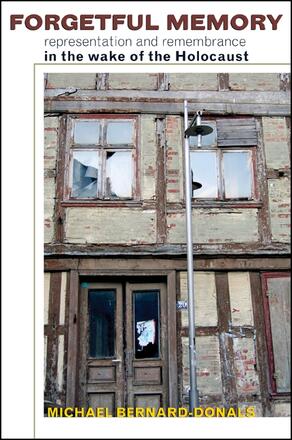
Forgetful Memory
Representation and Remembrance in the Wake of the Holocaust
Alternative formats available from:
Examines the role of forgetfulness in our understanding of the Holocaust.
Description
Much of the discussion surrounding the Holocaust and how it can be depicted sixty years later has focused on memory. In Forgetful Memory, Michael Bernard-Donals focuses on the relation between memory and forgetfulness, arguing that memory and forgetfulness cannot be separated but must be examined as they complicate our understanding of the Shoah. Drawing on the work of Josef Yerushalmi, Maurice Blanchot, David Roskies, and especially Emmanuel Levinas, Bernard-Donals explores contemporary representations of the Holocaust in memoirs, novels, and poetry; films and photographs; in museums; and in our contemporary political discourse concerning the Middle East. Ultimately, Forgetful Memory makes the case that we should give up on the idea of memory as a kind of representation, and that we should see it instead as an intersection of remembrance and oblivion, as a kind of writing, where what remains at its margins—what is left unwritten—is at least as important as what is given voice.
Michael Bernard-Donals is Nancy Hoefs Professor of English at the University of Wisconsin at Madison. He has written and edited several books, including (with Richard Glejzer) Between Witness and Testimony: The Holocaust and the Limits of Representation, also published by SUNY Press, and An Introduction to Holocaust Studies.
Reviews
"Forgetful Memory makes a major contribution to the growing literature on remembrance, and will be of interest to all who work in the fields of Holocaust, Memory and Trauma Studies. " — The Year's Work in Critical and Cultural Theory
"…Bernard-Donals has produced an insightful and broadly reaching work that demonstrates that not everything has already been said on the role of memory and its component of forgetting in Holocaust studies. " — H-Net Reviews
"Drawing on established work in trauma and Holocaust studies, philosophy, literary theory, and Jewish studies, each of the three major sections of Forgetful Memory addresses a different aspect of the relationship between history and memory … [its] limitations are counterbalanced by Bernard-Donals's intensive and illuminating efforts to bridge a vast array of disciplinary idioms and conceptual vocabularies. " — Clio
"This is a lucid and eloquent and consistently perceptive book. Exploring the vexed relationship between memory and forgetting, Bernard-Donals makes a powerfully persuasive case that the memory texts of the Holocaust are not—and cannot ever be—entirely credible. For some in Holocaust Studies today, to claim that memory texts have something necessarily figurative or false about them is to open the worrisome floodgates to Holocaust denial. Forgetful Memory refuses to give in to such worries. Yes, testimony necessarily fails to forge a transparent or seamless relation to the events to which testimony bears witness. But if we embrace the forgetful void at the heart of memory, we thus enable spontaneous acts of remembering that testify not to the certainties of a traumatic past but to the complexities involved in our memorial encounters with traumatic events themselves. What Forgetful Memory makes plain is that the future of such events—their lessons—are bound up ineluctably with these complexities. " — Paul Eisenstein, author of Traumatic Encounters: Holocaust Representation and the Hegelian Subject